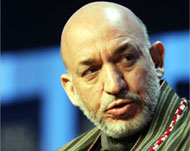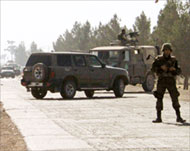Rice: US will not abandon Afghanistan
The US has pledged that it will never again neglect Afghanistan as politicians gather in London to celebrate the Central Asian country’s nascent democracy.

Hamid Karzai, the Afghan President, will travel from the Economic Forum in Davos, Switzerland, to a donor’s conference in London where he will be joined by Tony Blair, the British Prime Minister and Kofi Annan, the UN Secretary General, among others.
Karzai said in Davos: “We are going to London with great expectations of the countries participating as friends of Afghanistan, taking stock of what we have achieved in the last four years, evaluating our successes, our difficulties and our failures.”
Condoleezza Rice, the US Secretary of State, will also be at the two day gathering, the highlight of which will be the signing of the five-year Afghanistan Compact deal to aid the country’s fitful development.
No repeat
Rice met Karzai in Davos on Monday when she said the US would never abandon Afghanistan again, which it now sees as a strategic ally.
 |
|
Karzai says Afghanistan needs |
“We’re not going to make that mistake again,” she said.
The meeting between the two was to compensate for Rice’s early departure from London when she will head back to Washington for the annual State of the Union address from George Bush, the US President.
The Afghanistan Compact deal is to set out specific targets for bolstering security, improving governance, strengthening the rule of law and human rights, while boosting economic and social development.
The US government is expected to announce a major financial contribution for the next fiscal year during the conference, which will include representatives from 70 countries and organisations.
Washington has pumped about $5 billion into the reconstruction of Afghanistan since leading the war that toppled the Taliban four years ago, making it easily the country’s biggest donor.
10 more years
|
“We are going to London with great expectations of the countries participating as friends of Afghanistan” Hamid Karzai, |
The aid has brought new hospitals, clinics and roads, and school enrollment has soared from 900,000 to five million, with many of the new students being girls who were previously barred by the hardline Islamic regime from attending.
US and European officials say Washington now wants other countries and donors to help with the burden.
During a visit to Denmark on Sunday Karzai said Afghanistan would need international aid for five years, 10 years or even longer if it was to reinforce its security and rebuild its institutions.
He also called for more money to be put directly into the hands of the Afghan government, despite reluctance from donors amid fears of widespread corruption and incompetence.
Most Afghans remain mired in poverty, and the country still has some of the highest mortality rates in the world.
Ongoing concerns
Many have grown frustrated with the aid effort, complaining that much of the money flowing in from abroad has been wasted.
 |
|
The security situation is |
Security remains a major problem. About 1600 people were killed last year in rebel violence, including 91 US troops.
The past four months have seen an unprecedented spate of 20 suicide bombings, raising fears of further bloodshed.
The fighting has left parts of southern and eastern Afghanistan off-limits to aid workers.
The booming trade in opium and heroin is another major challenge for Karzai’s government. Afghanistan is the source of nearly 90% of both in the world.
This week’s donors’ conference comes as Nato prepares to raise its troop levels in Afghanistan from 11,000 to 18,500 over the next three years.
Ahead of the London conference, Human Rights Watch appealed to donors and Nato nations alike to help calm the climate of insecurity that has hampered development and access to basic public services for ordinary Afghanis.
Sam Zarifi, the research director for the human right group’s Asia division, said: “The real measure of security and development in Afghanistan is not the number of foreign troops, but whether people feel safe enough to go to the market, to travel at night, to seek medical care, or to send their children to school.”